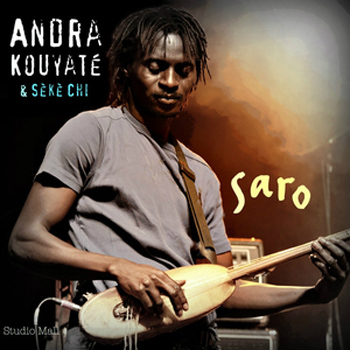Reviews July 26, 2012
Saro
It can’t be easy being the ngoni-playing younger brother of the world’s most famous ngoni player, Bassekou Kouyaté. But Andra Kouyaté and his group Sèkè Chi have delivered a debut CD that is confident, distinctive and in no way an imitation of big brother Bassekou’s juggernaut band Ngoni Ba. Well, it is similar in one way—the placement of the ancient fretless Malian lute at the center of spectacular musical action.
But Saro has its own sound. It’s a set of 16 short tracks that never wear out their welcome as they hit a number of marks—cranked-up griot jams, serene meditations, and a few surprises. Take the reinvented reggae of the title track with ngoni chops and chromatic balafon riffing from guest-spotting balafon ace Lassana Diabaté. “Sagare” delivers a big brooding sound, anchored in bass and organized around guest vocals by Amadou & Mariam. The CD’s lead track, “Yele,” sets the more dominant mood with a bright pace and spiky stretches of ngoni and calabash interplay sandwiching brief vocals. This is typical on Saro. Andra tends to reverse the usual balance of vocal and instrumental in Malian music, interspersing lengthy and interesting instrumentals with relatively brief vocal interludes.
Andra’s vocal is soft and dry, pleasant if not spectacular. He shares the singing on most songs with Salimata Kouyaté, who can belt out solo melody like a griotte diva (jelimousso), or tamp down to cool harmonies that blend seamlessly with Andra. On the song “Maningakan,” Andra’s wife Mah Bara Soumano—a star in her own right—summons a powerful, desert dry lead vocal over a beguiling, cantering groove. Bassekou’s wife Ami Sacko contributes richly to the warm, loping ballad “Dougoumassa.” So what vocals there are here are quite excellent, even if they take second billing to instrumental chops.
Speaking of which, Andra is one hell of an ngoni player. His solos crackle with energy and exuberance, almost impish with pent-up passion on the loping “Yereko.” His solos on the mid-tempo “Dana Mogo” or “Bassekou,” Andra’s tribute to his brother, and also “Aue Anfle,” a cranker in which Andra’s ngoni mixes it up with wah-wah and fuzz-tone electric guitar, are particularly good. “Bassekou” is the only track here recognizably based on a familiar traditional song, another sign of this CD’s original bent. Bassekou himself makes a perhaps inevitable appearances on two tracks, his distinctive note bends, phrasing and warm tone easy to spot.
In recent years, it’s become almost customary for the more creative Bamako musicians to nod to the Malian north with a song or two drawn from Songhai or Tuareg folklore. Once again, Andra takes an original approach to this on “African Union.” The song opens with a wavering, whispering, wild lead vocal backed by echoey ngoni and percolating tama vamp—a kind of percussive drone that sets the stage for a straight-up takamba rhythm. This song’s title rings ironic given events in Mali in 2012. Union seems quite out of reach for the moment, and if things don’t improve, even the artistic harmony between north and south that has nurtured so much great Malian music may suffer. Meanwhile, Saro stands as a fine example of Malian musical openness and pan-ethnic innovation at its best.










